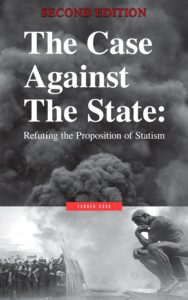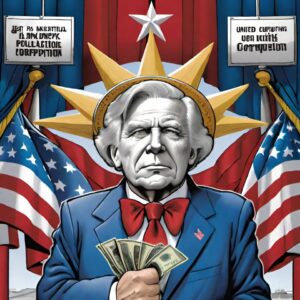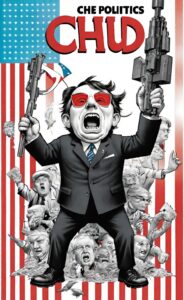It’s no secret that politics and corruption often go hand in hand. But when it comes to the United States, it seems that the two have become inseparable. From scandals to bribery and everything in between, the US political system has a long history of corruption. In fact, it’s safe to say that the US is leading the world in this realm. And while that may not be something to brag about, it’s certainly a topic worth exploring.
Unmasking the Truth: United States’ High Levels of Political Corruption
It might come as a shock to many, but the arena of political corruption isn’t just confined to unstable governments or weak economies. In fact, it tends to flourish where power is most concentrated, which, as it turns out, is the United States. Yet, it doesn’t take on the crude form of cash-in-hand bribery that is often witnessed elsewhere.
Rather, it’s hidden beneath the labyrinthine structures of legal jargon, lobbying efforts, campaign finance, and the drawing of electoral boundaries, effectively masking the true visage of corruption. We’re not talking about blatant acts of bribery here, but a sophisticated system that uses legal loopholes to perpetuate power and wealth.
Sure, it’s not the type of corruption that gets blazoned in headlines as scandalous exposés. It’s a more subtle, pervasive form of corruption, well-guarded behind a facade of legalese, that manipulates the system to serve the interests of a few, and not the many. A meticulously crafted guise of legal provisions, lobbying, campaign finances, and gerrymandering serves as the perfect smokescreen, keeping this corruption under wraps. It’s a complex, murky world of political maneuvering that needs to be navigated and understood, if we are to bring about any meaningful change.
Unseen Hand: Lobbying and Its Consequences
The act of lobbying is an enigmatic beast in the American political landscape. This multi-billion dollar industry presents itself as a shining example of governmental statism in action, a platform where interest groups can voice their concerns and shape policy. But peer beneath this polished exterior, and a more ominous narrative takes shape. Yes, the lobbyists articulate the concerns of a section of society, but often it’s the section with deep pockets and personal interests.
Through generous donations and persistent advocacy, they subtly bend the political will to align with their interests, not necessarily those of the general populace. While not illegal, this practice tilts the scales of policy making, with decisions swaying in favor of those who can afford the best lobbyists. Consequently, the resulting policies may lean towards favoring the wealthy, leaving the ordinary citizens’ interests underrepresented. Thus, though lobbying may appear democratic on the surface, its inner workings may serve as a pathway for the privileged to dictate policy, ultimately eroding the true spirit of freedom.
Legal Gray Area: Influence Peddling and Bribery in American Politics
Nudging the ethical boundary, high-ranking officials often exploit their positions for personal gains, blurring the lines between influence peddling and outright bribery. Tucked behind the respectable title of ‘consultancy,’ or shrouded by the harmless term ‘favors,’ or masked by seemingly innocuous ‘advantageous deals,’ the grimy fingerprints of corruption can be found. It’s not the open handed, back alley bribes that one might expect, but instead a more sophisticated, veiled transaction that often slips under the radar, with detrimental effects on the American political system.
Evasion, it seems, has become an art form in itself, honed and perfected to the point of near invisibility. It’s a delicate dance of power and privilege that unfolds behind closed doors, turning public service into a secretive game of gains. The integrity of public office is thus compromised, overshadowed by the relentless pursuit of personal benefits. The grim truth is that these subtle forms of bribery have woven themselves into the fabric of American politics, raising the question, when does influence become corruption, and how can we discern the difference?

> Check Current Book Prices <
Money Speaks Louder: The Menace of Campaign Finance
Navigating the wild terrain of American campaign financing feels a bit like embarking on a quest through an unregulated frontier. It’s a landscape marked by colossal donations from corporations, special interest groups known as Super PACs, and affluent individuals, effectively turning political races into a high-stakes financial contest. But what does this mean for the principle of equality and liberty? The fear is that this finance frenzy often leaves politicians feeling indebted to their generous benefactors, creating an unspoken obligation to return the favor in the form of policy decisions.
Let’s imagine, for instance, a corporation generously backing a candidate. Once that candidate is elected, wouldn’t they feel a certain pressure, maybe even a compulsion, to push for regulations and policies that favor that corporation? It’s a daunting prospect that raises essential questions about the integrity of our political system.
In the absence of stricter regulations and oversight, the campaign finance system continues to be a ticking time bomb threatening the very heart of freedom. The question then is not whether money talks in politics, we already know it does. The more pertinent question is, how loud should we allow it to speak before it drowns out the voice of the everyday person? (If it hasn’t already.)

Scourge of Gerrymandering: Manipulating Boundaries for Political Gain
Take a closer look at gerrymandering, an audacious display of political corruption that’s prevalent within the United States. This isn’t your run-of-the-mill corruption, it’s a shrewd game of twisting electoral boundaries to gain an upper hand. As voters, we would like to think our votes count equally. However, gerrymandering shatters this illusion, allowing a party to cling to power even without securing the majority vote. This cunning strategy redraws the political map, tipping the balance of representation in favor of those who play the system.
The essence of gerrymandering lies in manipulating geographical lines to cluster voters into specific electoral districts. Such surgical precision in drawing these boundaries results in an unbalanced political landscape, where the voices of some are amplified, while others are silenced. So, while on the surface it may seem like every vote is equal, the grim reality is that gerrymandering twists this basic tenet of democracy.
What makes gerrymandering particularly sinister is the subtlety with which it is conducted. It’s not a brazen theft of power, but a sly usurpation masked by the facade of legality. It is this cloaked corruption, woven into the fabric of the American political system, that poses a significant threat to the democratic principle of ‘one person, one vote’. Consequently, the real loser in this scenario is the unsuspecting voter, who is left wondering why their elected representatives don’t seem to reflect the public’s will. Unraveling the enigma of gerrymandering reveals a harsh reality, democracy is not just about casting votes, it’s about ensuring every vote carries equal weight.
Vicious Cycle: Corrupt Practices Promote More Corruption
In a striking demonstration of the destructive potential of corruption, these malpractices feed off one another, creating a vicious cycle that further perpetuates corruption. To illustrate, consider the influential role of affluent lobbyists who, with their deep pockets, can instigate policy alterations favoring their agendas. This not only gives them a distinct advantage in shaping the political landscape but can also exacerbate wealth disparities, giving the affluent even greater lobbying power.
This accumulated wealth can then be channeled into the arena of political campaign financing or utilized for gerrymandering. Consequently, the reach and impact of corruption continue to grow, entrenching the cycle of corrupt practices even deeper into the system. This cyclical nature of corruption serves as a stark reminder of the dire need to break free from this self-sustaining system to ensure a more equitable and truly democratic political environment.









